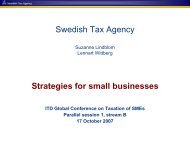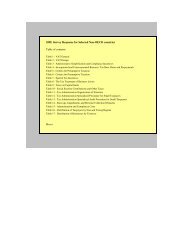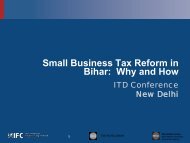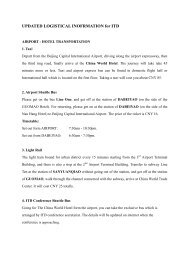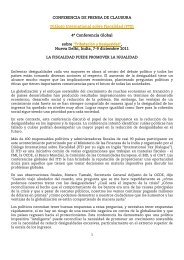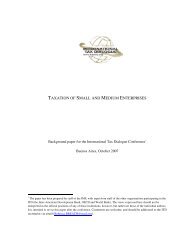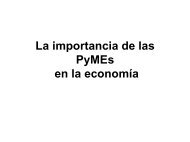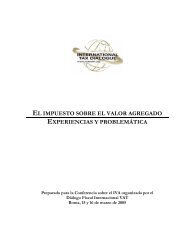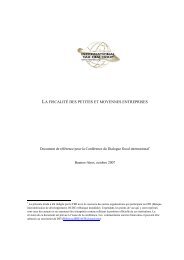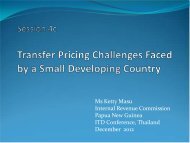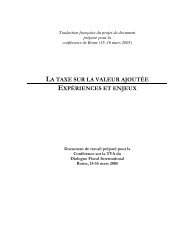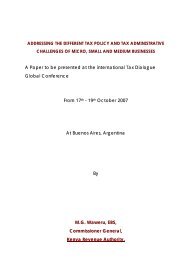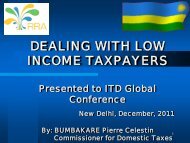Arcotia Hatsidimitris - International Tax Dialogue
Arcotia Hatsidimitris - International Tax Dialogue
Arcotia Hatsidimitris - International Tax Dialogue
You also want an ePaper? Increase the reach of your titles
YUMPU automatically turns print PDFs into web optimized ePapers that Google loves.
32 – 3. GETTING OFF TO A GOOD START<br />
The way in which a transfer pricing audit or enquiry is opened is a key factor in determining the time<br />
it will take and the quality of the eventual outcome. This chapter describes ways to improve the<br />
opening of transfer pricing audit or enquiries to ensure effective progress.<br />
Fact finding<br />
A successful and effective transfer pricing audit or enquiry is one that is focused and specific and,<br />
as discussed in Chapter 2, the risk identification process plays a critical part in laying the foundations<br />
for that. The next key step is the initial fact finding. Obtaining the right facts at the right time is an<br />
essential part of effective transfer pricing audits and crucial to the eventual outcome.<br />
Feedback from tax administrations and advisers alike suggests that facts and data should be<br />
established before arguments about the application of transfer pricing principles to those facts<br />
commence. Unfortunately it is only too common for both parties to enter into discussion of complex<br />
technical arguments and the detail of transfer pricing methodology before fully scoping the problem<br />
and agreeing which facts need to be established. The experience of advisers suggests that the fact<br />
finding phase of any transfer pricing audit or enquiry should be clearly distinguished from later phases<br />
and should be as collaborative an exercise as possible. Making a clear distinction between fact finding<br />
and the more adversarial stages of an enquiry helps to avoid technical arguments arising before the<br />
issues and facts are properly understood. Premature technical disputes are a regular cause of delay and<br />
wasted effort in transfer pricing enquiries.<br />
All tax administrations emphasised how important it is to be able to access business records<br />
relevant to transfer pricing audits or enquiries. For this report business records are either the<br />
underlying records of account of the business or specific records relevant to the pricing of the<br />
transaction under review and are often a mix of the two. At the stage of opening a transfer pricing<br />
audit or enquiry, tax administrations usually take one of two different approaches. Some issue an<br />
immediate, usually standard, request for relevant business records whilst others open a dialogue with<br />
business and find that an early meeting between the business, its advisers and the tax administration<br />
enables a more targeted request for business records to be made. Countries making a standard request<br />
for business records often find that their request can be facilitated by substantive rules requiring<br />
taxpayers to prepare a defined package of transfer pricing documentation describing the taxpayer’s<br />
related party transactions and supporting the transfer pricing determinations that have been made with<br />
economic analysis. In many countries, failure to prepare such transfer pricing documentation may be<br />
cause for imposition of substantial penalties.<br />
Early dialogue<br />
Whether or not the first step in an enquiry is a formal request for business records, there is a<br />
considerable degree of agreement between tax experts in business, advisers and transfer pricing<br />
specialists in tax administrations about the value of early dialogue. In one case mentioned by advisers,<br />
the focus of the enquiry was business restructuring. The taxpayer invited the tax administration team<br />
to a meeting at which the taxpayer gave a presentation about the commercial background of the<br />
restructuring. The taxpayer provided replies to questions posed in advance of the meeting, together<br />
with supplementary information to answer questions that had not yet been asked. The tax<br />
administration team obtained an understanding of commercial issues and an overview of the facts<br />
much earlier than would have been possible through written enquiries.<br />
Face to face dialogue on transfer pricing issues will generally be a more efficient and effective<br />
way to establish the overall commercial context of the transactions being reviewed and to establish the<br />
DEALING EFFECTIVELY WITH THE CHALLENGES OF TRANSFER PRICING © OECD 2012



